As the world rushes towards a greener future, driven by a growing demand for renewable energy, the Democratic Republic of Congo (DRC) stands at the heart of this transformation. Rich in crucial minerals like cobalt, copper, lithium, and nickel, the DRC is pivotal to powering the green revolution. However, the quest for these essential resources reveals a troubling paradox: the very minerals that promise a sustainable future are also tied to severe human suffering and ethical crises.
In the DRC, the drive for green energy has exposed a dark underbelly of exploitation and conflict. The nation’s vast mineral wealth, vital for producing batteries, solar panels, and wind turbines, is extracted amidst a backdrop of illegal mining, violent conflict, and systemic corruption. The eastern regions, where much of this extraction occurs, are plagued by ongoing warfare and human rights abuses, casting a shadow over the green energy boom.
The chilling realities of Congo’s mineral extraction industry reveal a dark side to the green energy revolution. As global demand for sustainable technologies surges, the race for essential minerals often translates into profound human suffering. The stark contrast between the promise of a sustainable future and the grim realities faced by those in mineral-rich regions highlights a pressing ethical dilemma. As the world advances towards renewable energy, it must confront and address these harsh truths to ensure that the pursuit of green technologies does not come at an unacceptable human cost.
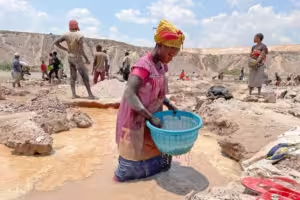
Why the world needs the Congo for Global Green Energy Technologies?
The Democratic Republic of Congo (DRC) holds a pivotal position in the global green energy transition due to its vast reserves of critical minerals. The country is the world’s leading supplier of several minerals like cobalt, copper, lithium, and nickel, all essential for manufacturing batteries, solar panels, and wind turbines.
These minerals are key to advancing green technologies and achieving global climate goals by facilitating a shift away from fossil fuels. As the demand for renewable energy sources intensifies, the DRC’s role becomes increasingly crucial in providing the raw materials necessary to power this transition and support the expansion of sustainable energy infrastructure.
However, the DRC’s wealth of mineral resources comes with substantial challenges. The mining sector is frequently marred by illegal activities, including unregulated mining operations and smuggling. Corruption and poor governance further complicate efforts to manage the sector transparently and sustainably.
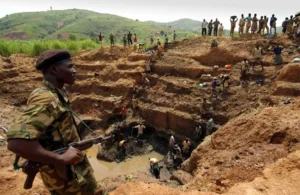
The Congo Conflict and the Curse of Mineral Wealth
Background
Beneath the blood-stained fields of eastern Congo lies a trove of coveted minerals, turning the country’s wealth into both a curse and a potential blessing. Once deemed a geological anomaly, Congo is now estimated to hold $24 trillion in mineral resources. Despite its immense wealth, the country is plagued by one of the deadliest conflicts since World War II, with over six million lives lost and seven million displaced.
This ongoing conflict is rooted in Congo’s complex history and post-colonial meddling. Armed groups, including the notorious M23 rebels, control key mineral-rich areas, exacerbating the illegal mineral trade. These groups are believed to receive external support, notably from neighboring Rwanda, complicating efforts to stabilize the region.
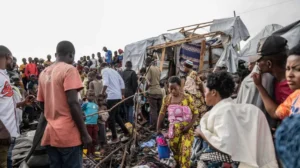
Since the 1990s, over 7 million people have been forcibly uprooted from their homes, seeking refuge from the ongoing conflicts that has already claimed an estimated 6 million lives. This instability not only disrupts the extraction and export of critical minerals needed for green energy solutions but also results in the breakdown of essential infrastructure and services.
Congo’s vast mineral resources, including 60% of the world’s cobalt and significant lithium deposits, attract multinational corporations. However, mining operations are often unregulated and associated with severe human rights abuses. Major tech companies have faced scrutiny for failing to ensure their supply chains are free from exploitation.
The reality
Congo has significant potential to contribute to the global shift towards renewable energy. It holds over 70% of the world’s cobalt, a critical component for the batteries that power electric vehicles (EVs) and store renewable energy. Additionally, the country possesses vast hydropower potential, with the Inga Dam project alone having the capacity to generate up to 40,000 megawatts of electricity, enough to power much of sub-Saharan Africa.
Despite these vast resources, Congo itself faces severe energy shortages. The majority of its population has no access to reliable electricity. This energy deficit hampers economic development, limits access to essential services like healthcare and education, and exacerbates poverty. Rural areas are particularly affected, with people relying on traditional biomass for cooking and lighting, leading to health problems and environmental degradation.
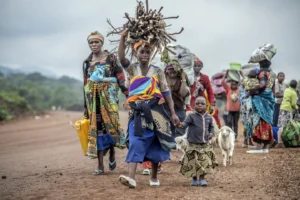
The dire humanitarian situation, characterized by severe shortages of food, healthcare, and basic necessities, further complicates the country’s capacity to support the global demand for renewable energy materials.
The ongoing conflict and lack of access to clean water and sanitation have led to widespread health emergencies and malnutrition. Humanitarian aid efforts are severely hampered by the volatile security situation, making it challenging for relief organizations to provide assistance. This instability not only threatens the lives and well-being of millions of Congolese but also poses risks to the global supply chain of critical minerals essential for advancing green technologies and achieving global environmental goals.
Risks and Escalations
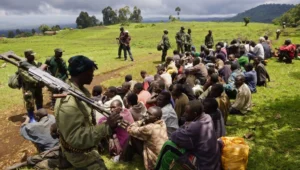
Being a key player in the global green energy transition the DRC faces significant problems related to the smuggling and illicit trade of these valuable resources. The illegal trade of minerals such as cobalt and copper not only sustains regional conflicts but also poses a threat to the integrity of global supply chains essential for renewable energy technologies.
These minerals often pass through intermediary countries like Rwanda and Uganda before reaching major refining and processing centers, facilitating a corrupt and exploitative supply chain. This corrupt and exploitative supply chain not only undermines governance but also perpetuates the funding of armed groups that contribute to regional violence further destabilizing the region.
Since 2023, renewed conflicts have exacerbated the situation, with various armed factions seizing control of key mining areas. In April 2024, the PARECO armed group, along with the Rwanda-backed M23 rebels, captured a critical mining area near Rubaya. Non-state armed groups also took control of gold mining sites in Fizi, South Kivu, and Ituri provinces. These factions often exploit local populations and engage in human rights abuses, complicating efforts to establish transparent and accountable systems for mineral extraction and trade.
The instability in the DRC not only affects the local population but also disrupts the global supply of critical minerals vital for advancing green energy technologies. The international community’s reliance on these resources makes it crucial to address these risks and ensure that the extraction and trade of minerals support sustainable and ethical practices.
Measures by President Félix Tshisekedi
Recognizing the DRC’s pivotal role in the global green energy transition, President Félix Tshisekedi has prioritized comprehensive reforms in the mining sector. These reforms aim to ensure that the DRC’s critical minerals are extracted and managed responsibly.
To this end, President Tshisekedi has initiated new exploration and investment strategies to create a more regulated and transparent mining environment. By attracting foreign investors through these initiatives, the government seeks to secure a stable and reliable supply of minerals crucial for green energy technologies. Promoting public-private partnerships is a key aspect of this strategy, ensuring that the benefits of mining extend to local communities and support sustainable development.
Furthermore, President Tshisekedi’s administration is committed to enhancing legal frameworks and regulatory oversight to combat corruption and curb illegal mining activities. These measures are designed to stabilize the mining sector and establish ethical practices, ensuring that the country’s rich mineral resources contribute positively to the global green energy transition while also fostering local economic growth and social well-being.
Role of International Community
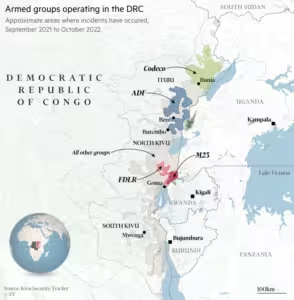
The international community plays a crucial role in addressing the challenges related to the DRC’s critical mineral resources, which are vital for the global green energy transition. UN Secretary-General António Guterres has emphasized the importance of a sustainable and equitable approach to renewable energy, stressing on the need to protect the rights and well-being of local populations in resource-rich areas.
International organizations and governments are called upon to support initiatives that promote responsible mining practices, ensuring that the extraction of minerals like cobalt, copper, and lithium is conducted ethically. By preventing the financing of conflicts through mineral trade and fostering transparent and accountable supply chains, the international community can help secure a steady and reliable supply of these critical resources.
The involvement of the international community is essential to ensure that the DRC’s mineral wealth contributes to global environmental goals rather than exacerbating conflict and instability. By promoting sustainable development and ethical practices, the international community can help facilitate the responsible use of the DRC’s mineral resources, thereby supporting the global transition to a greener and more sustainable future.
Click Crisis in the Congo X for more updates
Follow Friends of the Congo for more updates
Related Stories
Eastern Congo Ceasefire Extended for Two Weeks, U.S. Official Says
UAE Signs $1.9bn Deal to Develop Mines in Congo’s Turbulent East
















